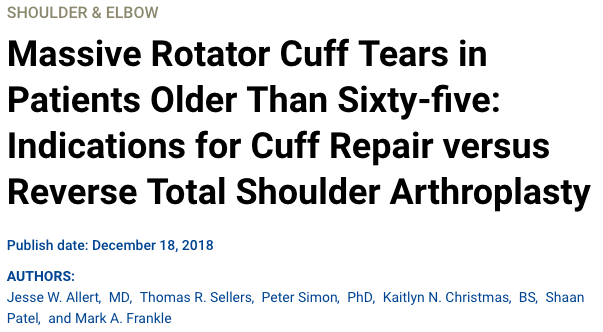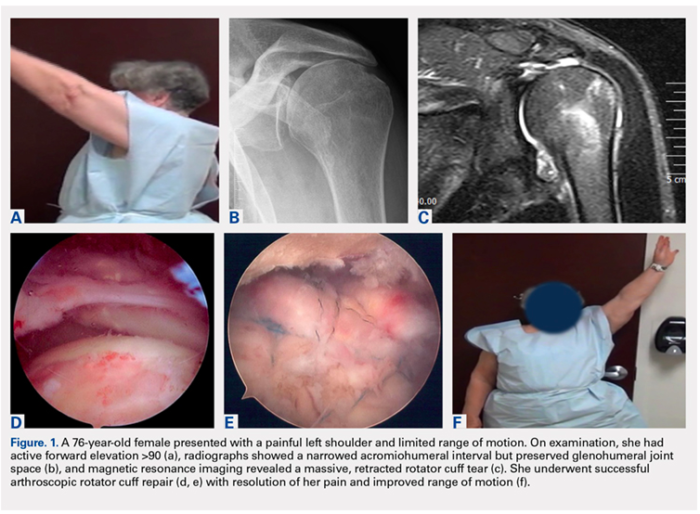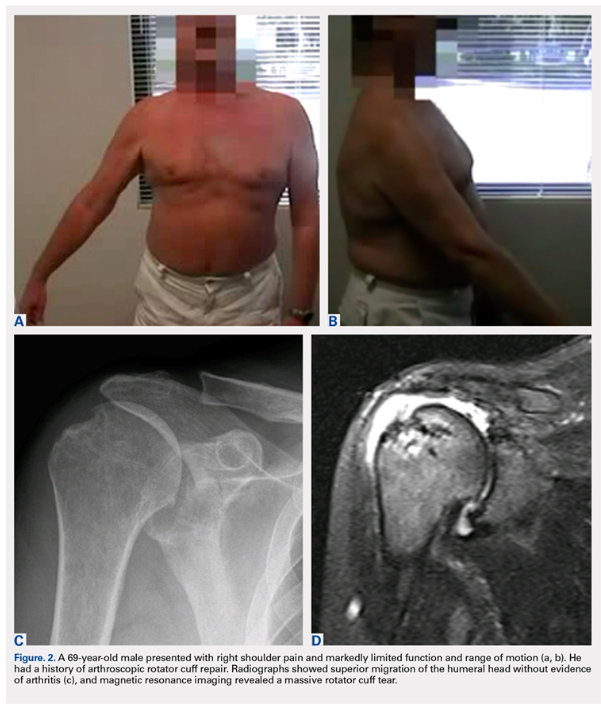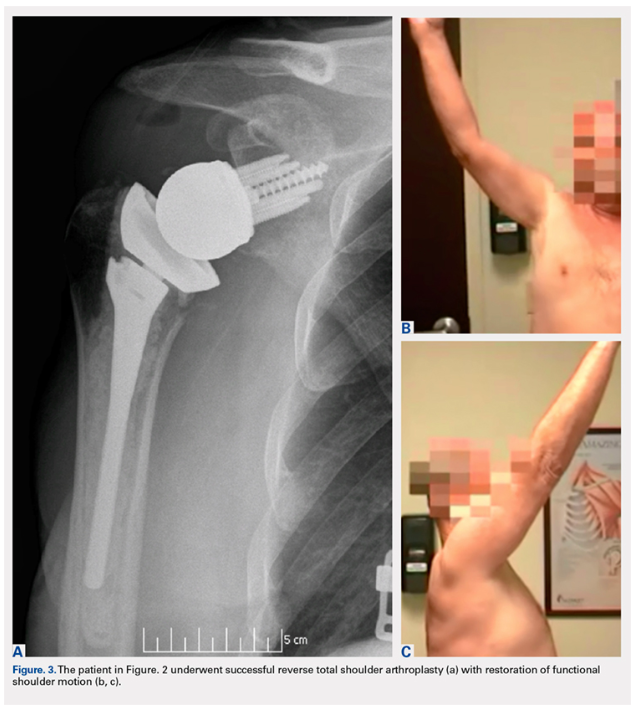Rotator Cuff Repair vs Reverse Total Shoulder Replacement – In New Study, Dr. Allert Helps Guide Treatment

Study Looks at Treatment Options for Massive Rotator Cuff Tears
Contributors: Dr. Allert is an orthopaedic shoulder and elbow surgeon at Restoration Orthopaedics, Maywood, Bergen County, New Jersey. Dr. Sellers and Dr. Patel are resident physicians at the University of South Florida, Department of Orthopaedic Surgery, Tampa, Florida. Dr. Simon and Ms. Christmas are Lead Scientist and Research Coordinator, respectively, at the Foundation for Orthopaedic Research and Education, Tampa, Florida. Dr. Frankle is an orthopaedic shoulder and elbow surgeon at the Florida Orthopaedic Institute, Shoulder and Elbow Service, Tampa, Florida.
Background: In patients older than 65 years of age, treatment of massive rotator cuff tears can be controversial. Two of the more common treatment options include arthroscopic rotator cuff repair or reverse total shoulder replacement.
Goals of study: (1) Assess preoperative variables that influence a surgeons decision to perform either reverse total shoulder replacement or rotator cuff repair (2) to evaluate the outcomes with each surgery.
Methods: 181 patients older than 65 underwent treatment for massive rotator cuff tear (95 underwent rotator cuff repair and 92 underwent reverse total shoulder replacement).
Take Home Points:
(1) Patients with previous rotator cuff repair, decreased range of motion, poor function, and strong radiographic evidence of subluxation were more likely to undergo reverse total shoulder arthroplasty.
(2) Patients selected for rotator cuff repair had greater preoperative flexion, abduction, and external rotation, as well as higher functional scores, and were less likely to have had previous cuff surgery.
(3) When chosen appropriately, both rotator cuff repair and reverse total shoulder arthroplasty can result in improved range of motion, function, and high patient satisfaction in this patient population.
Read on for more information or refer to American Journal of Orthopedics.
What is a “Massive Rotator Cuff Tear”?
Rotator cuff tears come in all shapes and sizes. They can be incomplete or complete. They can be small and crescent shaped or large, retracted, and L-shaped.
The rotator cuff is made up of 4 tendons and muscles – the supraspinatus, the infraspinatus, the subscapularis, and the teres minor. A “massive tear” has been defined as involving 2 or more of these tendons or a tear measuring >5cm in any single dimension.
A “massive” rotator cuff tear is not necessarily the same as an “irreparable” tear which cannot by repaired surgically. In fact, most massive rotator cuff tears CAN be repaired.
Massive Rotator Cuff Tear Treatment:
Treatment of massive rotator cuff tears can include arthroscopic, minimally invasive surgery or open surgery. Arthroscopic options involve the use of a camera, or arthroscope, through smaller incisions. They include established surgeries such as rotator cuff repair or newer options such as superior capsular reconstruction and balloon arthroplasty. In certain patient subsets, however, open surgery may be a better option. Open surgeries include tendon transfers or reverse shoulder replacement in which the rotator cuff tendons are “replaced by a prosthesis“.
In the elderly population, the treatment of rotator cuff tears can be more controversial. There is concern about tissue quality and the ability for the tendon to heal if repaired. For this reason, many advocate for a reverse shoulder replacement in certain cases where the tendon appears to be irreparable or with limited chance of healing.
As seen in this study, both arthroscopic rotator cuff repair AND reverse shoulder replacement can be good options in the right patient.
Arthroscopic Rotator Cuff Repair:
Most rotator cuff tears, including massive rotator cuff tears, can be repaired arthroscopically. This means using anchors and sutures placed through small incisions to repair the tendon.

Reverse Total Shoulder Replacement
Occasionally, rotator cuff tears that cannot be repaired may not be able to be treated arthroscopically. In these cases, the shoulder becomes unbalanced and can require the use of a prosthesis to balance the shoulder and optimize function and motion.


Take Home Points From Study:
Rotator cuff repair and reverse total shoulder arthroplasty are both viable options for patients >65 years with massive rotator cuff tears without arthritis.
Treatment must be individualized for each patient, with careful consideration of a number of preoperative variables and patient characteristics.
Patients with previous rotator cuff repair, decreased range of motion, poor function, and strong radiographic evidence of subluxation were more likely to undergo reverse total shoulder arthroplasty.
Patients selected for rotator cuff repair had greater preoperative flexion, abduction, and external rotation, as well as higher functional scores, and were less likely to have had previous cuff surgery.
When chosen appropriately, both rotator cuff repair and reverse total shoulder arthroplasty can result in improved range of motion, function, and high patient satisfaction in this patient population.
If You Have A Rotator Cuff Tear:
Each patient is different and should be treated as such. If you have injured your rotator cuff and are looking for treatment, seek the care of a shoulder specialist.
Dr. Jesse W. Allert specializes in open and arthroscopic shoulder and elbow surgery as well as orthopedic trauma. He completed an American Shoulder and Elbow Surgeons (ASES) accredited fellowship in Tampa, FL at the Florida Orthopaedic Institute (FOI), where he had the privilege of training under world-renowned surgeons Dr. Mark A. Frankle and Dr. Mark A. Mighell. There, he learned advanced arthroscopic techniques, served as the sports medicine physician for multiple teams, and trained with two pioneers in the realm of anatomic and reverse shoulder replacement surgery. With expertise in treating patients of all activity levels, Dr. Allert’s goal is to return his patients back to their desired level of activity using evidence based medicine and the least invasive treatment necessary.
Our areas of shoulder expertise include the following treatments and repairs:
- Shoulder Injuries
- Shoulder Replacement
- Reverse Shoulder Replacement
- Rotator Cuff Tears
- Shoulder Dislocation
- Labral Tear
- Rotator Cuff Repair
- Shoulder Arthritis
- Shoulder Pain
Selected Recent Publications Authored by Dr. Allert:
- – Rotator Cuff Injuries (Textbook)
- – Decision Making in Proximal Humerus Fractures
- – Does Fellowship Training Effect Patient Outcomes After Total Shoulder Replacement?
- – 10 year Outcomes After Reverse Total Shoulder Replacement
- – Bone Graft and Reverse Total Shoulder Replacement in Massive Rotator Cuff Tear
- – Visualization of the Biceps Tendon during Shoulder Arthroscopy
- – Arthroscopy Association of North America: Superior Capsular Reconstruction or Reverse Total Shoulder Replacement for Rotator Cuff Tear
Tags: Fellowship Trained, Hackensack University Medical Center, Reverse Shoulder Replacement, Rotator Cuff Tear, shoulder specialist
